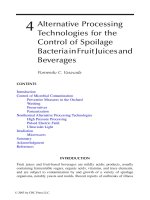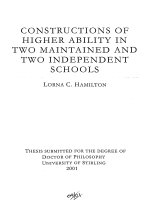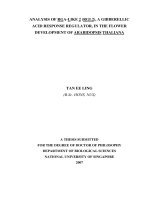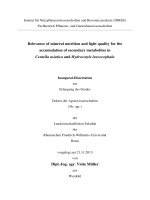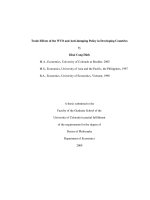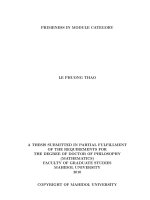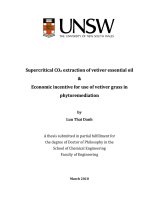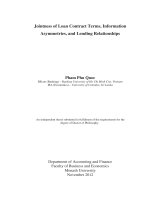THESIS SUBMITTED FOR THE DEGREE OF DOCTOR OF PHILOSOPHY - CONSTRUCTIONS OF HIGHER ABILITY IN TWO MAINTAINED AND TWO INDEPENDENT SCHOOLS
Bạn đang xem bản rút gọn của tài liệu. Xem và tải ngay bản đầy đủ của tài liệu tại đây (17.43 MB, 313 trang )
OF
CONSTRUCTIONS
ABILITY
IN
HIGHER
AND
TWO MAINTAINED
TWO INDEPENDENT
SCHOOLS
C. HAMILTON
LORNA
THESIS
FOR THE
SUBMITTED
DOCTOR
DEGREE
OF PHILOSOPHY
OF STIRLING
UNIVERSITY
2001
0
OF
For my dear dad and my beloveddaughter Katie
ACKNOWLEDGEMENTS
I would like to thank all of the research participants who generously gave
their time and shared their thoughts and ideas with me. I am also grateful
for the advice and support of my supervisors: Professor Sally Brown and
Professor Jon Nixon.
My thanks, in addition, to Professor Sheila Riddell
who encouraged me to begin this journey.
This thesis was completed
with financial support from the Economic and Social Research Council.
My special thanks go to my wonderful daughter and my friends for their
love and support.
ABSTRACT
This researchis an exploration of constructions of ability, especially`greaterability' within
four Maintained and Independent case study schools in Scotland, from a variety of group
perspectives. It seeksto illuminate the commonalties and differences between and within
schools in individuals' implicit theories of ability and explores the possible implications of
such constructs.
An analysis of policy and political debate provided the starting point for this research. This'
led into the empirical work in four case study schools.
Data were gathered from semi
structured interviews with headteachers, principal teachers of English, Maths, Art and music,
class teachers, parents and pupils. In addition, non-participant observation took place for
each subject area and class. Multiple perspectives helped to create meaningful layers of
perceptions of ability while also making it possible to analyse the complexity of values and
beliefs within each class and school.
The researchfound that there were distinctions to be made between schools in both sectors
which reflected contrasting viewpoints, echoing `communitarian concerns' and the `culture
of self interest' (Ball, 1997). However, the experiences, judgements and choices of
individuals presented a more complex pattern in which contradictory beliefs
could lead to
experiencesof dissonance in maintained schools and highlighted the importance of the
negotiatedability constructs being brought to bear by individualswithin institutions.
INTRODUCTION
1
Research Aims
Significance of Research
The Political Arena and Educational Policy
Teaching and the problem of ability
Methodology
Research Aims and Questions
Structure of thesis
CHAPTER 1 POLICY AND ABILITY
10
The Scottish Context
Policy, Politics and Values
Post Election Policies
Scotland and Policy
CHAPTER
2
SYSTEMS.
SCHOOLS
AND
POLICY
42
Systems,
schoolsand policies
Policy and Comprehensive schooling
Model of `Private' schools
Choice and systems
CHAPTER 3
RESEARCHING ABILITY
61
Ability and Education
Researching Ability
Explicit theories of ability
Implicit theories
Identity and Ability Constructions
CHAPTER
4
Research
questions
Contextualising the researcher
Research Design and Issues
METHODOLOGY
81
Participants
Research implementation
Gaining Access
Ethical issues
Data analysis
Headteachers and Principal teachers and consensus and dissonance
Teacher conceptualisations of pupil ability, teaching responses
and reflections
CHAPTER 5
INSTITUTIONS
AND ABILITY
107
Schools PolicyContexts
and
Maintained School 1 (MI)
Maintained School 2 (M2)
Independent School 1 (Ind 1)
Independent school 2 (Ind 2)
Headteacher Perceptions of Parents in MI and M2
Headteacher Perceptions of Parents in Ind I and Ind 2
The Assisted Places scheme and MI and M2
Headteachers Perceptions of The Assisted Places Scheme in Ind 1
and Ind 2
CHAPTER 6
TEACHERS AND ABILITY-(I)
Teachers ability
and
Maintained School I (Ml)
Maintained School 2 Teachers
Construing ability in M1 and M2
CHAPTER 7
TEACHERS AND ABILITY
173
(2)
Independent
School1
IndependentSchool 2
Construing ability in Ind 1 and Ind 2
CHAPTER 8
PARENTS AND ABILITY
Parentalperspectives
Parents in Maintained School 1 (M1)
ýýý
Parents in Maintained School 2 (M2)
Parents in Independent School 1 (Ind 1)
Parents in Independent 2 (Ind 2)
Cross Case Analysis of Parental Groups
CHAPTER 9
PUPILS AND ABILITY
229
Categories and perceived ability
The Four CaseStudy Schools
Maintained school 1- within case analysis
Maintained School 2- within case analysis
Independent School 1- within case analysis
Independent School 2 within case analysis
Across schools and systems
Pupils' constructions of ability across schools
CHAPTER 10
DISSONANCE & CONSENSUS
253
Dissonance in Individuals and Institutions
Institutional Dissonance and Institutional Identity
Temporal Shifts and Dissonance
Negotiation and Dissonance
Recategorisation and Dissonance
Challenges and Institutional Dissonance
Individual Dissonance
Resistance
Research
and Dissonance
Institutional Consensus and Individual Consonance
Dissonance, Ideological Struggle and Orthodoxy
CHAPTER 11
CONCLUSION
Constructing ability in Maintained and Independent schools
Institutions, Subjects and Groups - Ability and Dissonance
Maintained and Independent Schools Dissonance and Consensus
-
High Ability in English, Maths, Art and Music
266
Parents,Pupils and Teachers
Reflections
Bibliography
290
List of tables/appendices
301
Introduction
Research Aims
This research was initiated as a result of the researcher's interest in the ongoing political
debate concerning the perceived superiority of independent school provision for the very
able and the supposed inferiority of the `state' system (Ball, 1990). Consequently,the
aim of this study was to begin to explore varied perspectives within Maintained and
Independent schools in relation to ability. This was in order to illuminate differences
and similarities within and acrossschools and to begin to understand the ways in which
ability construction in such schools might reflect or contradict traditional policy and
societal views of system difference.
Significance of Research
The traditional view of an `egalitarian' state system and an `elitist' independent sector
promotes particular views of ability and the form that provision in schools should take in
relation to individual differences. This polarisation of views on ability is reflected in the
policy struggles, which have taken place since the 60s in the UK.
Although there have
been conflicting perspectives on ability within each of the major parties (Salter & Tapper,
1985), this study makes use of of Giddens' distinction (1998) between the two main
political philosophies underpinning
the old left and new right (e egalitarianism /
acceptance of inequality).
However, policy struggles are not only present in the explicit debates of political rhetoric
or in the implicit messagesabout ability within the documentation emerging from various
parties.
Ball (1994) suggests that policy is not the simple imposition of ideas on schools
individuals but instead is a problem posed which will find resolution of some kind in
and
the minds of individuals participating in it.
Or indeed, it may produce an ongoing
`struggle' which may not be capableof resolution. This struggle may be seen between
`schools' and policy makers in greater or lesser degrees of discord and congruity in
to ability. It may also be highlighted in administrative and organisational aspects
relation
within schools as well as in the teachers, pupils and parents within individual classrooms.
In this study, ability is seen as a multidimensional construct, mediated by individual
identities. For those participating in schools, ability is a `significant component of their
identity, ' (Mugny & Carugati, 1989), an important
in everyday experiences.
element
Jenkins (1996) supports a notion of there being an ongoing `synthesis' of internal and
external definitions of self. This should be seen as posing the potential for internal and
external ability constructs creating potential contradictions
(Mugny & Carugati, 1989).
in individuals'
identities
I would argue that in exploring the narratives of teachers,
pupils and parents, it is the nature of the tension at the boundary between internal and
external worlds of each that we may begin to understand the nature of ability
construction within the worlds of particular subjects and schools.
The Political Arena and Educational Policy
The political struggleof the last 35 yearsin the United Kingdom, concerning the purpose
different forms of schooling and the conceptualisationof ability inherent in
and role of
polarised views (Giddens, 1998) based on an egalitarian (old left)
such views generated
inequality (new right).
philosophy and acceptance of
The development of a
in the 60s emphasised the potential of the individual
comprehensive, all-comer, system,
being achieved through equalising access to educational opportunities.
This brought
it an attempt to move away from the measurement of `ability' of previous policy,
with
had tended to bring with it ideas of fixed capacity.
which
In addition, such
2
tended to fix that capacity at an early age through selective provision.
measurement
Instead comprehensivisation promoted a vision of `potential' which could be met and
developed within schools. It was argued that this could provide access to a wide
variety
of educational experiences and would not preclude individuals from making choices and
at different
progress
rates (Benn & Chitty, 1996).
However,
the 19 years of
Conservative party rule in the UK from 1978 to 1997 saw a government in power which
hostility toward the fluid model of potential and instead considered a
was promoting
`ability' to be of greater efficacy in managing educational provision (Dring &
measurable
Walford, 1997). Along with this perceived need to measure ability came the Assisted
Places Scheme which encouraged the belief that, `private provision was superior to that
' (Walford, 1990, p 107). Through this scheme more able children from
of the state,
`poorer' families were to be given the chance to participate in the `superior' Independent
system.
Thus the conceptualisation of ability in politics continued to emphasise not
the divide over the nature of ability but also the way in which the state might
only
interact with ability within policy and schools and impact upon individuals.
Scotland is unusual as an educational subsystem within the UK in the coherence of its
provision since all state high schools are comprehensive schools. A popular
state system
Scottish education as a high quality and equality promoting
self-view of
system
(McCrone, 1992; Paterson, 1997b) encourages confidence in the efficacy of that system
for all `abilities. '
It is against this particular Scottish context that UK led right
wing
has established a discourse of marketisation through such strategies as parental
reform
school league tables and encouragement for increased performance through
choice,
organising learning (i.e. setting HMI, 1997). In addition,
selection within schools when
Ball (1990) terms a discourse of derision, set out to denigrate the possibility that
what
education could be effective for all children.
comprehensive
The ongoing policy
3
discourses relating to ability continued to focus on structures and organisation of
learning rather than questioning the nature of ability within educational contexts.
Teaching and the problem of ability
However, research over the last 30 years, into teacher identification of very able children
has pointed to problems of unreliability, discrepancy and bias: from the work of Pegnato
Birch (cited in Gear, 1976) carried out in the 60s, in which they question teachers'
and
fundamental understanding of the nature of intelligence, to the work carried out in the
70s by Tempest (1974) and Gear (1976) which highlighted unreliable teacher judgement
basis for identification
as the sole
of very able children.
Discrepancies between
individual teachers were also brought to the fore in Maltby (1984) and Eyre (1997a).
Schack and Starko (1990) and Maker (1994) confirmed a tendency for teachers to
definitions and identification measures despite the developments
concentrate on narrow
by theorists with regard to intelligence (Gardner, 1985; Sternberg, 1990).
made
In Scotland, within the context of an egalitarian state system of education (maintained),
where comprehensive, all-comer
high schools deal with more than 96% of secondary
children, research carried out by Thomson et al (1995) and Hamilton (1999)
school age
into teacher views of the very able, has begun to explore the nature of these personal
ability. The former research alludes to the lack of identification of very
conceptions of
and the reasons put forward as potential justification.
able children
`Teachers are
frightened to commit themselves now because they are frightened they are making the
judgement, ' (Thomson et al, p 37,1995). The latter noted contextualised high
wrong
in teacher judgement. This led to a reinforcement of particular assumptions
confidence
the nature of different kinds of ability and subsequent provision and classroom
about
judgements resulting from these.
4
Freeman(1998),reviewing current international researchwith regard to teachersand the
identification
of the very able, noted the ongoing nature of these problems.
She
that there is a need for research which considers how teachers' `personal
suggested
conceptions of ability or stereotypes of giftedness affect his or her teaching, ' (p8).
to investigate the complexity of ability construction,
seeking
In
both from a teaching
but also from the views of others such as pupils, parents, headteachers and
perspective
principal teachers, our understanding of ability constructs may serve to provide much
illumination for an area darkened by assumption.
needed
Methodology
Scotland's education system is organised separately from that in England and Wales.
Around 96% of children attend government funded state schools (Maintained) while
4% attend private schools (Independent). While the state systemis dominated by
about
system and is perceived to support an egalitarian ideology with regard
the comprehensive
schools in the Independent sector may often be selective in terms of ability or
to pupils,
financially selective.
simply
With a background of political and policy debate and
development which reflected polarised views of ability, an analysis of policy was to be the
for this research. This led into the main body of the empirical work which
starting point
form of case studies of four schools, two within each of the sectors alluded to
took the
a view to understanding policy and provision in relation to very able children
above, with
observation and interviews.
through
The case study schools were chosen for the
following characteristics:
Maintained
"
Comprehensive
-
very mixed socio-economic areas with seeming lack of `success' in exam
one serving
league tables with around 800 pupils (Ml)
"
serving mainly high socio-economic areas with public `success' in exam league
one
800 pupils (M2)
tables with around
5
Independent
"
only informal selection by interview with around 300 pupils in total
one school using
across Nursery and up to S6 in high school (Ind 1)
"
long established school with selection by ability with around 1700 pupils from
one
Nursery to S6 (Ind 2)
Within each school a range of semi structured interviews took place as well as classroom
connected to four subject areas: English, Maths, Art and Music. Interviews
observation
each headteacher and each subject head of department in relation to the very able,
with
learning experiences and the values and beliefs underpinning the organisation of
their
learning were undertaken.
There then followed teacher interviews and classroom
in each subject for each of two agegroups: (i) around 12 years old and (ii)
observation
15 years old and about to sit external examinations for the first time. Teachers
around
interviewed initially briefly and asked to nominate children considered to be `very
were
in their class and those considered to be good middle of the class. Observation of
able'
lessons occurred subsequently and teachers were asked to reflect on what went well
during
their lesson.
Finally they were interviewed
and any areas arising from
were included. Both sets of children were then interviewed and the parents
observations
contacted by telephone. The use of multiple perspectives was helpful in
of able children
meaningful layers of perceptions of ability while also making it possible to
creating
the complexity of values and beliefs being brought to bear within each class and
analyse
school.
6
Research Aims and Questions
The research aims are as follows:
To explore the ways in which practitioners
9
and maintained
and participants
in the independent
sectors interpret the category of very able pupil
To investigate beliefs and perceptions with regard to the nature of provision for
"
such
children
organisational
and
how
and curricular
To consider prevailing
"
social and political
it
is believed
they
are manifested
in
social,
areas
beliefs and practices indicative
of support for particular
ideologies and values
These in turn have led to the following research questions:
1. How do teachers
perceive category `very
the
working withinparticular schools
of
able'
average'
pupil?
and
in
2. In what waysdo teachers dferent schools
that
consider theymay havea roletoplay
/ `average'
in theidentification development the `very
pupil? How do they
of
and
able'
to
perceive processesoperate
withintheirinstitution?
such
3. How do pupils in differentinstitutionsperceive construction their own and
the
of
greaterability' and thepossibilitythat experiences interactions
and
within school
may
play apart in this?
4. How do theparentsof `very
their
able'pupils perceive position within school
and their
learningexperiences expectations
within society?
and
7
Structure of thesis
This
research was
envisaged in
response to
an
interest
in
the
conflicting
of ability present within political debate. This led to a consideration
conceptualisations
the contexts within which ability is discussed and debated and to schools where
of
`ability' conceptualisation would play an important role in the ways in which individuals
deal with and experience teaching and learning. Chapter 1 deals with the political
might
over the last 20 years and the ways in which they reflect greater and lesser eras
struggles
discord over the nature of ability.
of policy
differing forms of school provision
In chapter 2, the relationship between
and perceived notions of ability are explored as an
the political debate established in the first chapter.
extension of
In the next chapter,
3, the `struggles' within research on intelligence/ability
chapter
discussed.
are
The
their impact upon educational contexts, as well as the implicit theories or
nature of
of individuals within schools are explored.
constructs
Chapter 4 considers the research methodology, the tensions arising from the focus of
problems faced when participants refuse `to play the game' and the iterative
the research,
analysis carried out.
Chapter 5 deals with the administrative and organisational areas of ability `struggle' from
the perspectives of headteachers and principal Teachers of English, Maths, Art and
Music. Principal teachersoutlined their personaland professional notions of ability while
headteachersdelineated the ways in which interior and exterior issues with regard to
reconciled Chapters 6 and 7 consider teacher constructions of
ability provision were
ability within and across case study schools.
Chapter 6 deals with these in the two
Maintained schools while chapter 7 considersthe two Independent schools.
8
Chapter 8 looks at the ways in which parentsof nominated `very able ` pupils construed
in relation to their child in a specific subject area as well as their views on school
ability
and ability. In addition, parental choice and ability is explored.
There is a recognition of the uniqueness of pupil constructs in Chapter 9 in that they in
are the focal point of ability `judgements.' This chapter utilises a framework
particular
to highlight strands of ability construction which allow the researcherto
which serves
identify distinctive tensionsor congruitiesin pupil constructs,within and acrossschools.
Subsequently, chapter
institutional
10 explores the nature and potential
and individual
dissonance and institutional
interactions
between
consensus and individual
Chapter 11, firstly draws attention to the ways in which this research has
consonance.
the research questions. Finally, conclusions are considered with regard to
answered
broader issues raised by this study.
9
Chapter 1 Policy and Ability
Introduction
This chapter is concerned with the ways in which ability is represented in political
ideology and documentation in what is called policy discourse. In order to begin to
the ways in which the maintenance and shifts of policy over the last 20 years
establish
have demonstrated particular beliefs about ability and consequently the nature of
this chapter considers firstly, the distinctiveness of the Scottish policy
schooling,
the importance of policy discoursesin attempts to shape educational
context and
Secondly,the politics of ability is explored within Conservative
structuresand values.
reform and as part of the education agenda established in the 1997
educational
general election.
This is then followed by an examination of post election policy
development and ability.
Finally, Scotland's ability agenda is investigated and its
independence considered, in light of the changing perspectives on ability
continued
Maintained and Independent schools emerging from Westminster.
and
The Scottish Context
It is not possible to begin to approach issues of ability identification
perception without
first addressing the nature of the Scottish context.
and teacher
Both the
in place and the policy documents of the 90s are reflective of a tension
school system
implicit in a society where comprehensive education is dominant.
Ninety-six
per
high school age children attend such schools (Clark & Munn, 1997) and
cent of
therefore unlike other parts of the UK, Scotland does not present parents and pupils
of choices in schooling. Superficially at least, we have a systemwhich
with a variety
in adopting comprehensive education so willingly,
has promoted
the view that
10
of opportunity is the predominant theme and where selection by ability (for
equality
entry) occurs within the independentsystembut not within the maintained sector.
Consequently, discussion of very able children deals not only with a group of
who are already perceived as successfulbut also initiates debate over the
children
nature of provision
within
schools, especially when the schools concerned are
supposedly capable of providing for a range of abilities.
A popular self-view of
Scottish education as a high quality and equity promoting system (McCrone, 1992),
lead to questions over the need for any developments for this particular group of
may
be deemed to be achieving success through this type of schooling.
children who may
It is against this particular Scottish context that UK led right wing reform has
a discourse of marketisation through such strategies as parental choice,
established
league tables and increasing encouragement for increased performance i. e. quality of
through selection within schools when organising learning e.g. setting (HMI,
output,
1997).
The need to consider the nature of this discourse is discussed in the following pages.
Subsequently an exploration of the policy documentation of major parties is made
to and after the GE of 1st May 1997. The effects of this development of
prior
Scottish context are then considered in greater detail.
educational policy within a
Policy and Politics
Ball (1994) puts forward the view that policy is not something which is done to
but instead that policies pose problems which are then solved in context. In
people
to gain an understanding of this we need to look at the policy context to gain
order
of the struggle which ensues. He argues that a lot of research
an understanding
education or schooling which does take place, is not about policy at all, that it
about
is a kind of `significant present absence,' (Ball, 1997).
Policy is ignored or theorised `out of the picture'. This is
particularly the case in research about classrooms, about
teachers and about schools which treats them as free-standing
and self-determining, as `out of context. ' (op cit, p 265,1997)
It is considered essential in this study that an assessment of educational policy is
integral facet of the research, both at national and institutional level as well
made an
at the point of `struggle'in the `classroom',in teacher,pupil and parent discourse.
as
Questions over the interpretation, measurementand provision for differing forms of
have been the backbone of much educational policy over the last half-century.
ability
From the tripartition
of provision and ability in the 40s and 50s, to the right wing
the 80s and 90s, individuals or groups of individuals have sought to
policies of
a view of educational systems, curricula and organisation of learning which
outline
have made assumptions about interpretations
of ability in relation to schooling
(Wooldridge, 1994; Foster et al, 1996; Walford, 1997). The values inherent in these
interpretations
and judgements gain authority in the guise of educational policy
(Kogan, 1985) and may condition teacher based value setting.
There is a need then to investigate educational policy in relation to the theme of this
ability, and to establish the ways in which attempts have been made to `pose
research,
problems' for schools in connection with ability, the assumptions about ability and
the diffuse value systems and subsystems which have been created. This involves
considering the development of education policy in Scotland as a subsystem of UK
12
policy (Humes & McKenzie, 1994) through an interrogation of the policy discourse
in evidence within
party manifestos and education papers and documents. The
consideration of policy is also of particular significancein relation to the Scottish selfperception of a system representing egalitarian educational values.
These values
have been at odds with the educational reforms emerging from Westminster which
have continued to promote an adherence to specific views of ability.
Policy, Politics and Values
In the following pages,ability within the policies of the ConservativeParty and Old
Labour are viewed as polarised views.
While it is accepted that there have been
conflicting views of ability and ability provision within parties (Salter & Tapper, 1985;
Ball, 1990) over the years,consideration is given to the broad emphatic brushstrokes
the political philosophies supporting the new right and old left perspectives.
of
Giddens (1998) focuses on the key characteristics of old left and new right
philosophies.
The important elements of these concerning ability, are the old left's
for egalitarianism and new right's persistence in accepting inequality
strong support
fundamental to decisions made in education.
as
brought
with
it, attempts to move away from
The advent of New Labour has
educational policies driven by
ideological stances (Power and Whitty, 1999). Instead, a pragmatic third way has
been sought which, it will be argued, has shifted ability discourse from within the
old left or new right while presenting distinct continuities
traditional philosophies of
Thatcherite reform.
with
In this next section, the ways in which Conservative Party policy has encouraged
has reinforced structural and conceptual inequality within
educational reform, which
in relation to ability, are examined first.
schools
Next Old Labour support for an
13
egalitarian philosophy and the shifting stance of New Labour on the approach to the
General Election in 1997 are considered.
manifestos is then examined.
The education debate in major party
Subsequently, the ability discourse generated in the
light of a New Labour victory is discussed.
Conservative Government
The new. right focus on a notion of easily identifiable and distinct abilities and
provision between and within schools, highlighted a tendency to revive
segregated
as innate and measurable. The acceptance of inequality
conceptions of ability
inherent in these views, has in the past, led to a denial of equal opportunities for
becauseof social class (Foster et al, 1996) or minority membership
certain groups
(Gillborn, 1998).
This revival of what Gillborn and Youdell (2000) term the new IQ-ism, has gained
in the 90s with the support of some academics (Hernstein and Murray,
some ground
1994).
However, ability for such major researchers on intelligence as Sternberg
(1996) and Gardner (1985) remains a contested and complex concept which cannot
be reduced to hereditarian perspective. Conservative policy, nonetheless,was to
embrace ability as measurable through performance and their policies were to reflect
of the egalitarianismsymbolisedby the old left.
a rejection
Education, Education, Education
After 18 years in power the ConservativeParty had had the opportunity to influence
in a major way the route that education would take (Gillborn & Youdell, 2000). The
announcement of the General Election
in 1997, was supposed to create a platform
for debate on an issue which had already been such an important
element of
14
Parliamentary confrontation over policy and the perceived inequities of the
Government as Labour focusedon, ' Education! Education! Education!'
Since the early seventies when policy was driven and educational agendas largely set
by Local Authorities and trade unions, ConservativeGovernment policies had seena
reversal of this situation.
Major structural changes in curriculum
and school
had come about through the increasing dominance of central government
character
in what was deemed a national service and national concern (Walford, 1994).
This
led to an increasingly traditionalist approach to education and an emphasis on results
discipline as a remedy for the perceived influx of progressive teaching and
and
learning ideas.
For the Conservatives, these represented not only a failing system
but also one that reflected left wing ideology and therefore automatically involved
at odds with those of the traditionalism of the Conservative right (Power &
values
Whitty, 1999).
However, it has really been in the last ten years that this impetus for
radical reformation of the education system has taken hold as a major method of
promoting a particular value system and also as a major area of concern to voters and
(Ball, 1990; Ball, 1994; Pring & Walford, 1997).
their children
Selectionand Segregation
The perceived superiority of the private system in terms of high performance, value
for money and traditional approaches to teaching, learning and educational goals, was
importable infrastructure for a state systemwhich was to be encouragedto
seenas an
emulate the success of the private sector (Salter & Tapper, 1985). This was to come
about
by a move away from
educational
opportunity
for
all through
the
comprehensivesystem,to a diversity of provision for particular skills and abilities and
selection for entry to specific schools.
15
In addition to selection and diversity of provision, schools were to be encouraged to
for children by attracting parents to them through success in exam results.
compete
The market ideology of the independent system was thought to be able to encourage
higher achievement while highlighting `failing schools'.
However there was also a
distrust of the Local Authorities and their influence on schooling and so gradually
their responsibility for and effect on education was eroded. Meanwhile, centralisation
through a National Curriculum in England and 5-14 guidelines in Scotland
of control
domination conjoined with increased budgetary control of institutions by
and policy
individual headteachers, sought to loosen the local government connections with
educational development.
This was a way of attempting to gradually avoid the
filtration of policy by potentially hostile LAs
and a further decrease in Local
Authority control would have been a major element of Conservative efforts if they
had won the `97 election.
Conservative Policy, then, has been marked by the domination of Central
Government
policy generation; an attempt to dissolve Local Authority
control
development and individualisation of finance and
through centralisation of policy
attackson progressiveeducation and consequentlythe Labour Party.
administration;
For the Conservativessuch ideologieswere synonymouswith this party and also with
failing schools and falling standards.Eagleton (1991) comments on the tendency for
to avoid locating their own educational policies within
right wing politicians
ideological frameworks since to do so `would be to risk turning them into objects of
' (Eagleton, p6,1991). Conversely the Conservative Party saw itself as
contestation,
representativeof `traditional' and, by implication, effective methods.
In order to
16
bring a return to such traditional methods and values, the Conservatives sought to
encourage a change in the emphasis on Teacher Training courses from the theoretical
to almost entirely practical, so encouraging a skill based profession with direct
government support of whole class teaching but avoiding the `contamination' of
discussion and debate within specific Training institutions.
Standardsand Competition
An over riding theme of all policy had been a perceivedneed to raise standardsin the
face of the supposed lack of successof the Comprehensive system (Ball, 1990).
Recent attempts to compare achievementin various subjects on a global scale had
with achievement - Britain did not do very well in this
exacerbated a preoccupation
League table.
ultimate
This only served to add impetus to the need for a system
allow the educationalcapabilitiesof children to be enhanced. For the
which would
Conservative Party this could be achieved through the use of the market forces
themes of competition
and accountability in order to force up standards and
consequently achievement.
This emphasison a fiercely `competitive learning society' (Benn & Chitty, 1996) and
school culture led to new right support for ability segregation
performance orientated
between schools and within schools through the use of setting and selection( the
latter in England).
Despite research evidence which found that there was little
indication that such organisation of learning was enabling for the very able child
(Harlen and Malcolm, 1997) and the quantity of work done which suggested that it
actually lead to division and injustice (Foster et al, 1996; Gillborn, 1998), it was
would
a major aspect of educational policy.
The policies of the Conservatives sought to
comprehensive schools, which represented, for them, a failed system
undermine
17
